Ethical and Legal Principles in Australian Healthcare: A Review
VerifiedAdded on 2022/08/23
|10
|3083
|32
Essay
AI Summary
This essay delves into the ethical and legal principles that govern healthcare practices in Australia. It examines the roles and responsibilities of nurses, the importance of patient rights, and the legal frameworks that regulate the healthcare system. The paper discusses key concepts such as non-maleficence, autonomy, and beneficence, exploring how these principles influence decision-making in medical scenarios. It also addresses issues of medical negligence, cultural sensitivity, and the significance of therapeutic relationships. Furthermore, the essay analyzes the Australian Charter of Healthcare Rights and the regulatory bodies that ensure patient safety and ethical conduct. The discussion includes a case study involving Mr. Murray, highlighting the ethical dilemmas faced by healthcare professionals and the legal implications of their actions. Overall, the essay emphasizes the importance of maintaining high ethical standards and adhering to legal obligations to provide quality patient care within the Australian healthcare system. This assignment is available on Desklib, a platform providing AI-based study tools for students.
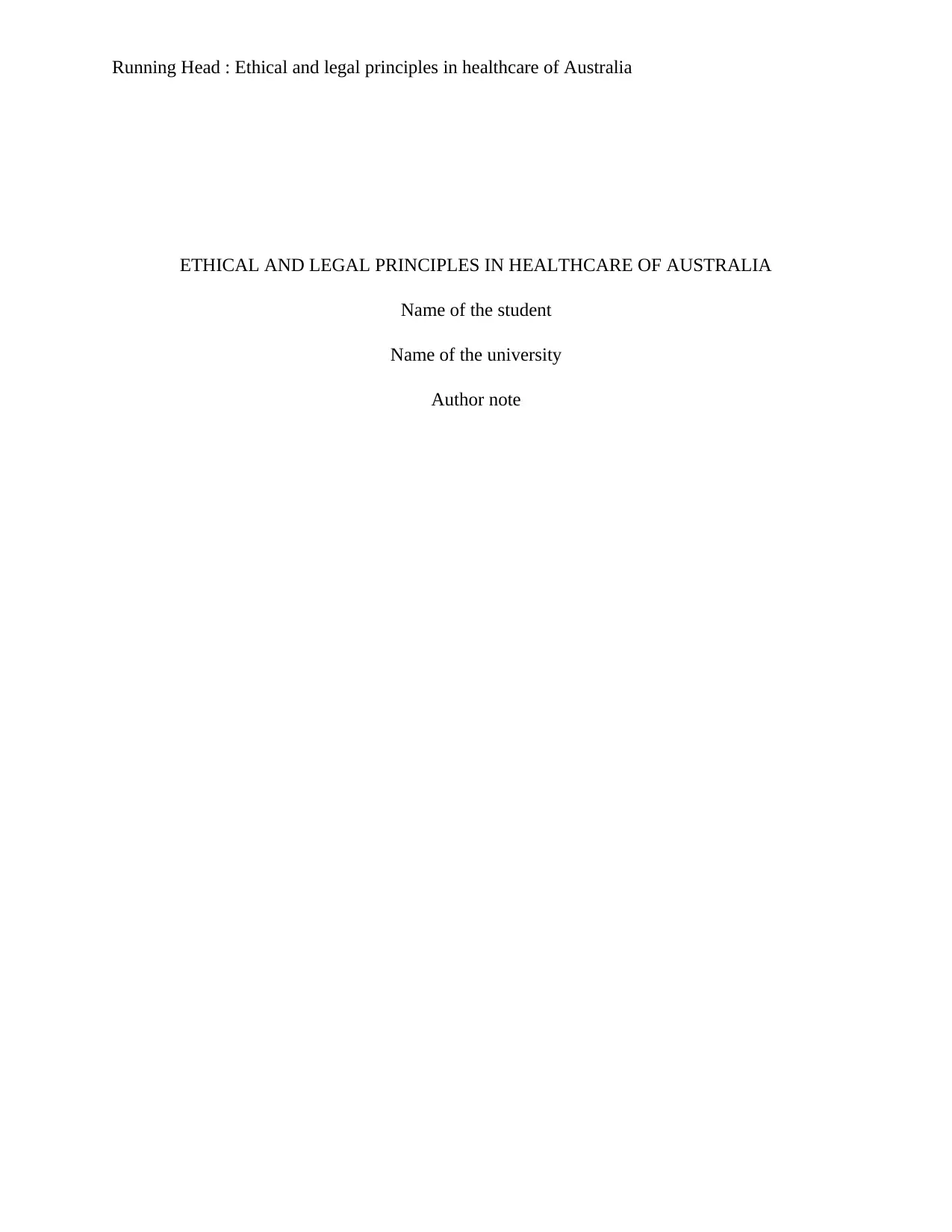
Running Head : Ethical and legal principles in healthcare of Australia
ETHICAL AND LEGAL PRINCIPLES IN HEALTHCARE OF AUSTRALIA
Name of the student
Name of the university
Author note
ETHICAL AND LEGAL PRINCIPLES IN HEALTHCARE OF AUSTRALIA
Name of the student
Name of the university
Author note
Paraphrase This Document
Need a fresh take? Get an instant paraphrase of this document with our AI Paraphraser
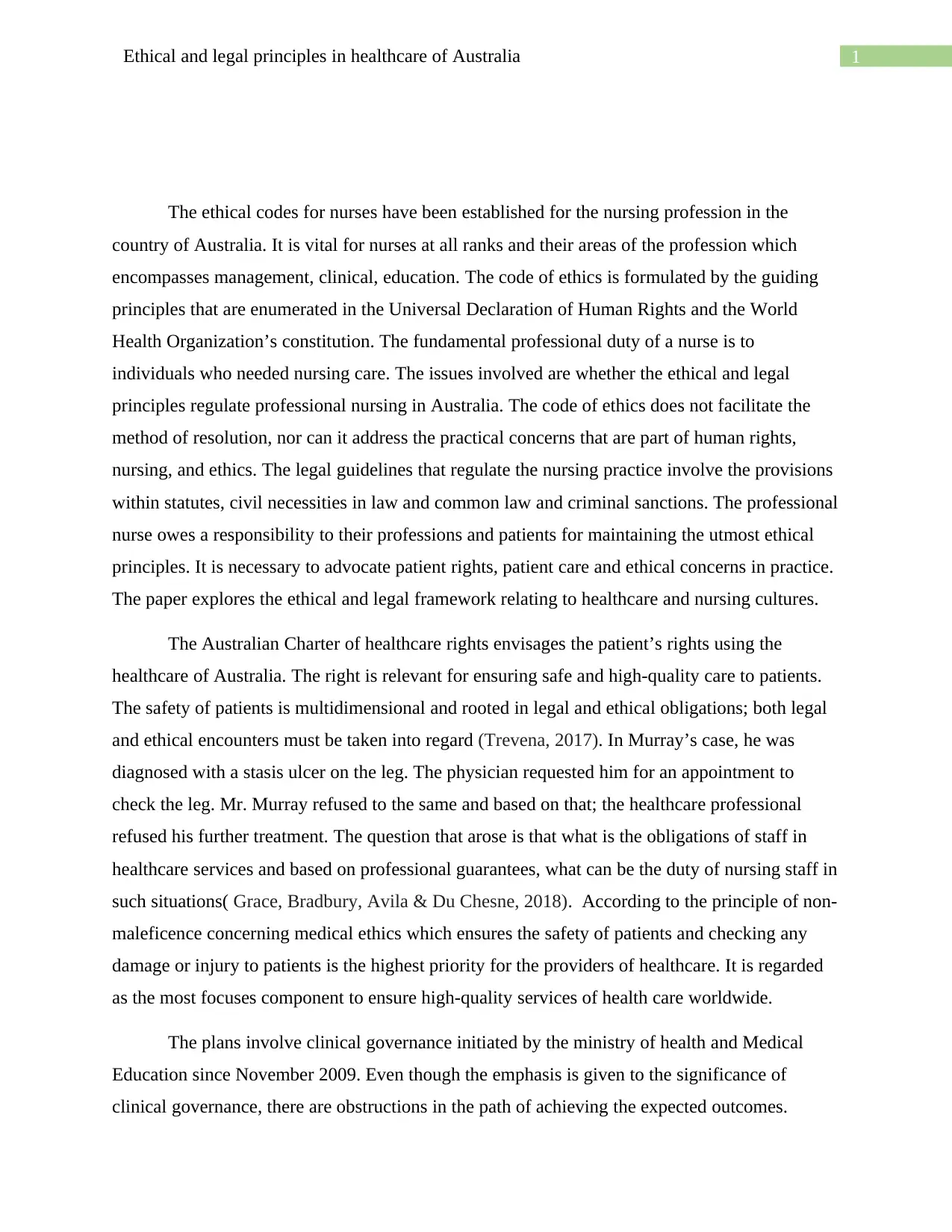
1Ethical and legal principles in healthcare of Australia
The ethical codes for nurses have been established for the nursing profession in the
country of Australia. It is vital for nurses at all ranks and their areas of the profession which
encompasses management, clinical, education. The code of ethics is formulated by the guiding
principles that are enumerated in the Universal Declaration of Human Rights and the World
Health Organization’s constitution. The fundamental professional duty of a nurse is to
individuals who needed nursing care. The issues involved are whether the ethical and legal
principles regulate professional nursing in Australia. The code of ethics does not facilitate the
method of resolution, nor can it address the practical concerns that are part of human rights,
nursing, and ethics. The legal guidelines that regulate the nursing practice involve the provisions
within statutes, civil necessities in law and common law and criminal sanctions. The professional
nurse owes a responsibility to their professions and patients for maintaining the utmost ethical
principles. It is necessary to advocate patient rights, patient care and ethical concerns in practice.
The paper explores the ethical and legal framework relating to healthcare and nursing cultures.
The Australian Charter of healthcare rights envisages the patient’s rights using the
healthcare of Australia. The right is relevant for ensuring safe and high-quality care to patients.
The safety of patients is multidimensional and rooted in legal and ethical obligations; both legal
and ethical encounters must be taken into regard (Trevena, 2017). In Murray’s case, he was
diagnosed with a stasis ulcer on the leg. The physician requested him for an appointment to
check the leg. Mr. Murray refused to the same and based on that; the healthcare professional
refused his further treatment. The question that arose is that what is the obligations of staff in
healthcare services and based on professional guarantees, what can be the duty of nursing staff in
such situations( Grace, Bradbury, Avila & Du Chesne, 2018). According to the principle of non-
maleficence concerning medical ethics which ensures the safety of patients and checking any
damage or injury to patients is the highest priority for the providers of healthcare. It is regarded
as the most focuses component to ensure high-quality services of health care worldwide.
The plans involve clinical governance initiated by the ministry of health and Medical
Education since November 2009. Even though the emphasis is given to the significance of
clinical governance, there are obstructions in the path of achieving the expected outcomes.
The ethical codes for nurses have been established for the nursing profession in the
country of Australia. It is vital for nurses at all ranks and their areas of the profession which
encompasses management, clinical, education. The code of ethics is formulated by the guiding
principles that are enumerated in the Universal Declaration of Human Rights and the World
Health Organization’s constitution. The fundamental professional duty of a nurse is to
individuals who needed nursing care. The issues involved are whether the ethical and legal
principles regulate professional nursing in Australia. The code of ethics does not facilitate the
method of resolution, nor can it address the practical concerns that are part of human rights,
nursing, and ethics. The legal guidelines that regulate the nursing practice involve the provisions
within statutes, civil necessities in law and common law and criminal sanctions. The professional
nurse owes a responsibility to their professions and patients for maintaining the utmost ethical
principles. It is necessary to advocate patient rights, patient care and ethical concerns in practice.
The paper explores the ethical and legal framework relating to healthcare and nursing cultures.
The Australian Charter of healthcare rights envisages the patient’s rights using the
healthcare of Australia. The right is relevant for ensuring safe and high-quality care to patients.
The safety of patients is multidimensional and rooted in legal and ethical obligations; both legal
and ethical encounters must be taken into regard (Trevena, 2017). In Murray’s case, he was
diagnosed with a stasis ulcer on the leg. The physician requested him for an appointment to
check the leg. Mr. Murray refused to the same and based on that; the healthcare professional
refused his further treatment. The question that arose is that what is the obligations of staff in
healthcare services and based on professional guarantees, what can be the duty of nursing staff in
such situations( Grace, Bradbury, Avila & Du Chesne, 2018). According to the principle of non-
maleficence concerning medical ethics which ensures the safety of patients and checking any
damage or injury to patients is the highest priority for the providers of healthcare. It is regarded
as the most focuses component to ensure high-quality services of health care worldwide.
The plans involve clinical governance initiated by the ministry of health and Medical
Education since November 2009. Even though the emphasis is given to the significance of
clinical governance, there are obstructions in the path of achieving the expected outcomes.
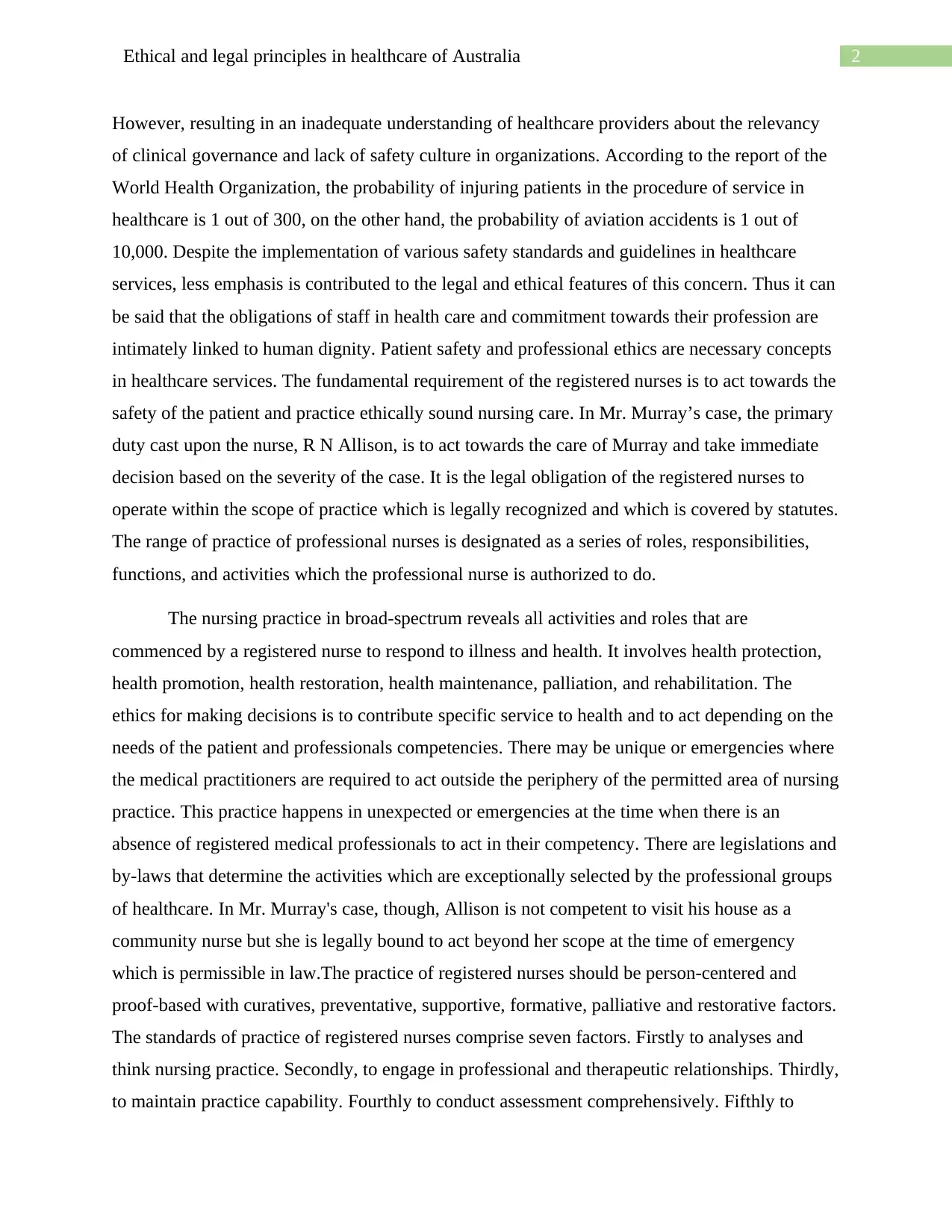
2Ethical and legal principles in healthcare of Australia
However, resulting in an inadequate understanding of healthcare providers about the relevancy
of clinical governance and lack of safety culture in organizations. According to the report of the
World Health Organization, the probability of injuring patients in the procedure of service in
healthcare is 1 out of 300, on the other hand, the probability of aviation accidents is 1 out of
10,000. Despite the implementation of various safety standards and guidelines in healthcare
services, less emphasis is contributed to the legal and ethical features of this concern. Thus it can
be said that the obligations of staff in health care and commitment towards their profession are
intimately linked to human dignity. Patient safety and professional ethics are necessary concepts
in healthcare services. The fundamental requirement of the registered nurses is to act towards the
safety of the patient and practice ethically sound nursing care. In Mr. Murray’s case, the primary
duty cast upon the nurse, R N Allison, is to act towards the care of Murray and take immediate
decision based on the severity of the case. It is the legal obligation of the registered nurses to
operate within the scope of practice which is legally recognized and which is covered by statutes.
The range of practice of professional nurses is designated as a series of roles, responsibilities,
functions, and activities which the professional nurse is authorized to do.
The nursing practice in broad-spectrum reveals all activities and roles that are
commenced by a registered nurse to respond to illness and health. It involves health protection,
health promotion, health restoration, health maintenance, palliation, and rehabilitation. The
ethics for making decisions is to contribute specific service to health and to act depending on the
needs of the patient and professionals competencies. There may be unique or emergencies where
the medical practitioners are required to act outside the periphery of the permitted area of nursing
practice. This practice happens in unexpected or emergencies at the time when there is an
absence of registered medical professionals to act in their competency. There are legislations and
by-laws that determine the activities which are exceptionally selected by the professional groups
of healthcare. In Mr. Murray's case, though, Allison is not competent to visit his house as a
community nurse but she is legally bound to act beyond her scope at the time of emergency
which is permissible in law.The practice of registered nurses should be person-centered and
proof-based with curatives, preventative, supportive, formative, palliative and restorative factors.
The standards of practice of registered nurses comprise seven factors. Firstly to analyses and
think nursing practice. Secondly, to engage in professional and therapeutic relationships. Thirdly,
to maintain practice capability. Fourthly to conduct assessment comprehensively. Fifthly to
However, resulting in an inadequate understanding of healthcare providers about the relevancy
of clinical governance and lack of safety culture in organizations. According to the report of the
World Health Organization, the probability of injuring patients in the procedure of service in
healthcare is 1 out of 300, on the other hand, the probability of aviation accidents is 1 out of
10,000. Despite the implementation of various safety standards and guidelines in healthcare
services, less emphasis is contributed to the legal and ethical features of this concern. Thus it can
be said that the obligations of staff in health care and commitment towards their profession are
intimately linked to human dignity. Patient safety and professional ethics are necessary concepts
in healthcare services. The fundamental requirement of the registered nurses is to act towards the
safety of the patient and practice ethically sound nursing care. In Mr. Murray’s case, the primary
duty cast upon the nurse, R N Allison, is to act towards the care of Murray and take immediate
decision based on the severity of the case. It is the legal obligation of the registered nurses to
operate within the scope of practice which is legally recognized and which is covered by statutes.
The range of practice of professional nurses is designated as a series of roles, responsibilities,
functions, and activities which the professional nurse is authorized to do.
The nursing practice in broad-spectrum reveals all activities and roles that are
commenced by a registered nurse to respond to illness and health. It involves health protection,
health promotion, health restoration, health maintenance, palliation, and rehabilitation. The
ethics for making decisions is to contribute specific service to health and to act depending on the
needs of the patient and professionals competencies. There may be unique or emergencies where
the medical practitioners are required to act outside the periphery of the permitted area of nursing
practice. This practice happens in unexpected or emergencies at the time when there is an
absence of registered medical professionals to act in their competency. There are legislations and
by-laws that determine the activities which are exceptionally selected by the professional groups
of healthcare. In Mr. Murray's case, though, Allison is not competent to visit his house as a
community nurse but she is legally bound to act beyond her scope at the time of emergency
which is permissible in law.The practice of registered nurses should be person-centered and
proof-based with curatives, preventative, supportive, formative, palliative and restorative factors.
The standards of practice of registered nurses comprise seven factors. Firstly to analyses and
think nursing practice. Secondly, to engage in professional and therapeutic relationships. Thirdly,
to maintain practice capability. Fourthly to conduct assessment comprehensively. Fifthly to
⊘ This is a preview!⊘
Do you want full access?
Subscribe today to unlock all pages.

Trusted by 1+ million students worldwide
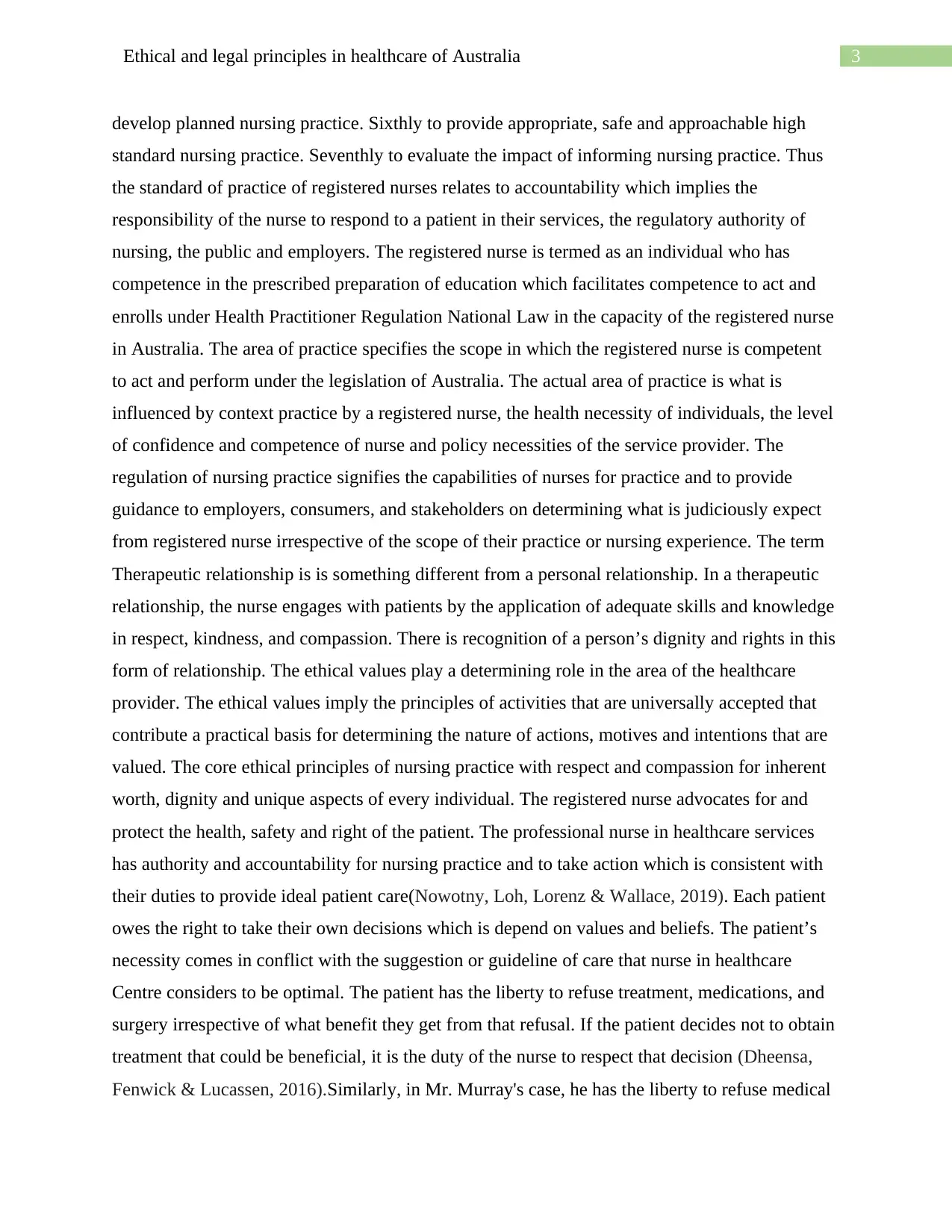
3Ethical and legal principles in healthcare of Australia
develop planned nursing practice. Sixthly to provide appropriate, safe and approachable high
standard nursing practice. Seventhly to evaluate the impact of informing nursing practice. Thus
the standard of practice of registered nurses relates to accountability which implies the
responsibility of the nurse to respond to a patient in their services, the regulatory authority of
nursing, the public and employers. The registered nurse is termed as an individual who has
competence in the prescribed preparation of education which facilitates competence to act and
enrolls under Health Practitioner Regulation National Law in the capacity of the registered nurse
in Australia. The area of practice specifies the scope in which the registered nurse is competent
to act and perform under the legislation of Australia. The actual area of practice is what is
influenced by context practice by a registered nurse, the health necessity of individuals, the level
of confidence and competence of nurse and policy necessities of the service provider. The
regulation of nursing practice signifies the capabilities of nurses for practice and to provide
guidance to employers, consumers, and stakeholders on determining what is judiciously expect
from registered nurse irrespective of the scope of their practice or nursing experience. The term
Therapeutic relationship is is something different from a personal relationship. In a therapeutic
relationship, the nurse engages with patients by the application of adequate skills and knowledge
in respect, kindness, and compassion. There is recognition of a person’s dignity and rights in this
form of relationship. The ethical values play a determining role in the area of the healthcare
provider. The ethical values imply the principles of activities that are universally accepted that
contribute a practical basis for determining the nature of actions, motives and intentions that are
valued. The core ethical principles of nursing practice with respect and compassion for inherent
worth, dignity and unique aspects of every individual. The registered nurse advocates for and
protect the health, safety and right of the patient. The professional nurse in healthcare services
has authority and accountability for nursing practice and to take action which is consistent with
their duties to provide ideal patient care(Nowotny, Loh, Lorenz & Wallace, 2019). Each patient
owes the right to take their own decisions which is depend on values and beliefs. The patient’s
necessity comes in conflict with the suggestion or guideline of care that nurse in healthcare
Centre considers to be optimal. The patient has the liberty to refuse treatment, medications, and
surgery irrespective of what benefit they get from that refusal. If the patient decides not to obtain
treatment that could be beneficial, it is the duty of the nurse to respect that decision (Dheensa,
Fenwick & Lucassen, 2016).Similarly, in Mr. Murray's case, he has the liberty to refuse medical
develop planned nursing practice. Sixthly to provide appropriate, safe and approachable high
standard nursing practice. Seventhly to evaluate the impact of informing nursing practice. Thus
the standard of practice of registered nurses relates to accountability which implies the
responsibility of the nurse to respond to a patient in their services, the regulatory authority of
nursing, the public and employers. The registered nurse is termed as an individual who has
competence in the prescribed preparation of education which facilitates competence to act and
enrolls under Health Practitioner Regulation National Law in the capacity of the registered nurse
in Australia. The area of practice specifies the scope in which the registered nurse is competent
to act and perform under the legislation of Australia. The actual area of practice is what is
influenced by context practice by a registered nurse, the health necessity of individuals, the level
of confidence and competence of nurse and policy necessities of the service provider. The
regulation of nursing practice signifies the capabilities of nurses for practice and to provide
guidance to employers, consumers, and stakeholders on determining what is judiciously expect
from registered nurse irrespective of the scope of their practice or nursing experience. The term
Therapeutic relationship is is something different from a personal relationship. In a therapeutic
relationship, the nurse engages with patients by the application of adequate skills and knowledge
in respect, kindness, and compassion. There is recognition of a person’s dignity and rights in this
form of relationship. The ethical values play a determining role in the area of the healthcare
provider. The ethical values imply the principles of activities that are universally accepted that
contribute a practical basis for determining the nature of actions, motives and intentions that are
valued. The core ethical principles of nursing practice with respect and compassion for inherent
worth, dignity and unique aspects of every individual. The registered nurse advocates for and
protect the health, safety and right of the patient. The professional nurse in healthcare services
has authority and accountability for nursing practice and to take action which is consistent with
their duties to provide ideal patient care(Nowotny, Loh, Lorenz & Wallace, 2019). Each patient
owes the right to take their own decisions which is depend on values and beliefs. The patient’s
necessity comes in conflict with the suggestion or guideline of care that nurse in healthcare
Centre considers to be optimal. The patient has the liberty to refuse treatment, medications, and
surgery irrespective of what benefit they get from that refusal. If the patient decides not to obtain
treatment that could be beneficial, it is the duty of the nurse to respect that decision (Dheensa,
Fenwick & Lucassen, 2016).Similarly, in Mr. Murray's case, he has the liberty to refuse medical
Paraphrase This Document
Need a fresh take? Get an instant paraphrase of this document with our AI Paraphraser
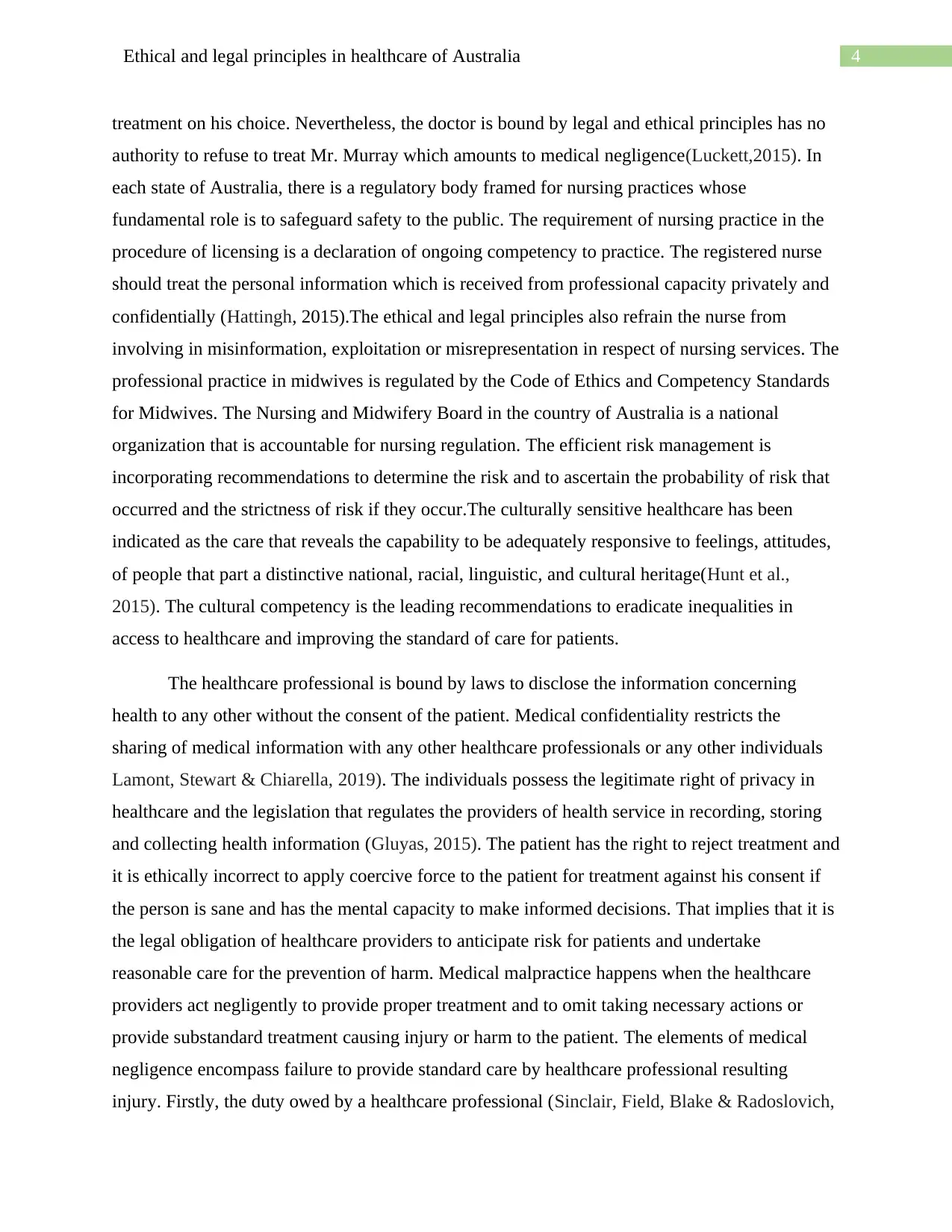
4Ethical and legal principles in healthcare of Australia
treatment on his choice. Nevertheless, the doctor is bound by legal and ethical principles has no
authority to refuse to treat Mr. Murray which amounts to medical negligence(Luckett,2015). In
each state of Australia, there is a regulatory body framed for nursing practices whose
fundamental role is to safeguard safety to the public. The requirement of nursing practice in the
procedure of licensing is a declaration of ongoing competency to practice. The registered nurse
should treat the personal information which is received from professional capacity privately and
confidentially (Hattingh, 2015).The ethical and legal principles also refrain the nurse from
involving in misinformation, exploitation or misrepresentation in respect of nursing services. The
professional practice in midwives is regulated by the Code of Ethics and Competency Standards
for Midwives. The Nursing and Midwifery Board in the country of Australia is a national
organization that is accountable for nursing regulation. The efficient risk management is
incorporating recommendations to determine the risk and to ascertain the probability of risk that
occurred and the strictness of risk if they occur.The culturally sensitive healthcare has been
indicated as the care that reveals the capability to be adequately responsive to feelings, attitudes,
of people that part a distinctive national, racial, linguistic, and cultural heritage(Hunt et al.,
2015). The cultural competency is the leading recommendations to eradicate inequalities in
access to healthcare and improving the standard of care for patients.
The healthcare professional is bound by laws to disclose the information concerning
health to any other without the consent of the patient. Medical confidentiality restricts the
sharing of medical information with any other healthcare professionals or any other individuals
Lamont, Stewart & Chiarella, 2019). The individuals possess the legitimate right of privacy in
healthcare and the legislation that regulates the providers of health service in recording, storing
and collecting health information (Gluyas, 2015). The patient has the right to reject treatment and
it is ethically incorrect to apply coercive force to the patient for treatment against his consent if
the person is sane and has the mental capacity to make informed decisions. That implies that it is
the legal obligation of healthcare providers to anticipate risk for patients and undertake
reasonable care for the prevention of harm. Medical malpractice happens when the healthcare
providers act negligently to provide proper treatment and to omit taking necessary actions or
provide substandard treatment causing injury or harm to the patient. The elements of medical
negligence encompass failure to provide standard care by healthcare professional resulting
injury. Firstly, the duty owed by a healthcare professional (Sinclair, Field, Blake & Radoslovich,
treatment on his choice. Nevertheless, the doctor is bound by legal and ethical principles has no
authority to refuse to treat Mr. Murray which amounts to medical negligence(Luckett,2015). In
each state of Australia, there is a regulatory body framed for nursing practices whose
fundamental role is to safeguard safety to the public. The requirement of nursing practice in the
procedure of licensing is a declaration of ongoing competency to practice. The registered nurse
should treat the personal information which is received from professional capacity privately and
confidentially (Hattingh, 2015).The ethical and legal principles also refrain the nurse from
involving in misinformation, exploitation or misrepresentation in respect of nursing services. The
professional practice in midwives is regulated by the Code of Ethics and Competency Standards
for Midwives. The Nursing and Midwifery Board in the country of Australia is a national
organization that is accountable for nursing regulation. The efficient risk management is
incorporating recommendations to determine the risk and to ascertain the probability of risk that
occurred and the strictness of risk if they occur.The culturally sensitive healthcare has been
indicated as the care that reveals the capability to be adequately responsive to feelings, attitudes,
of people that part a distinctive national, racial, linguistic, and cultural heritage(Hunt et al.,
2015). The cultural competency is the leading recommendations to eradicate inequalities in
access to healthcare and improving the standard of care for patients.
The healthcare professional is bound by laws to disclose the information concerning
health to any other without the consent of the patient. Medical confidentiality restricts the
sharing of medical information with any other healthcare professionals or any other individuals
Lamont, Stewart & Chiarella, 2019). The individuals possess the legitimate right of privacy in
healthcare and the legislation that regulates the providers of health service in recording, storing
and collecting health information (Gluyas, 2015). The patient has the right to reject treatment and
it is ethically incorrect to apply coercive force to the patient for treatment against his consent if
the person is sane and has the mental capacity to make informed decisions. That implies that it is
the legal obligation of healthcare providers to anticipate risk for patients and undertake
reasonable care for the prevention of harm. Medical malpractice happens when the healthcare
providers act negligently to provide proper treatment and to omit taking necessary actions or
provide substandard treatment causing injury or harm to the patient. The elements of medical
negligence encompass failure to provide standard care by healthcare professional resulting
injury. Firstly, the duty owed by a healthcare professional (Sinclair, Field, Blake & Radoslovich,
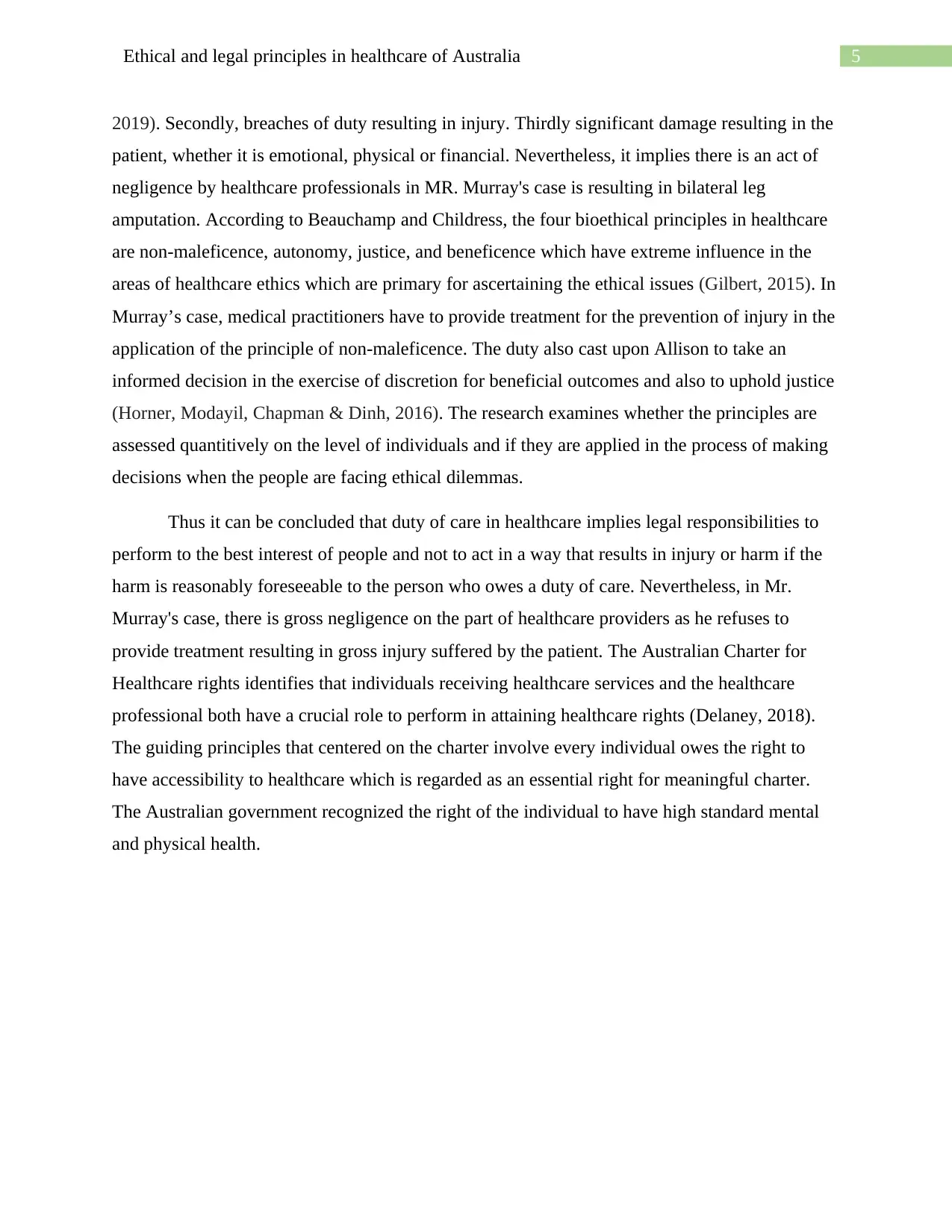
5Ethical and legal principles in healthcare of Australia
2019). Secondly, breaches of duty resulting in injury. Thirdly significant damage resulting in the
patient, whether it is emotional, physical or financial. Nevertheless, it implies there is an act of
negligence by healthcare professionals in MR. Murray's case is resulting in bilateral leg
amputation. According to Beauchamp and Childress, the four bioethical principles in healthcare
are non-maleficence, autonomy, justice, and beneficence which have extreme influence in the
areas of healthcare ethics which are primary for ascertaining the ethical issues (Gilbert, 2015). In
Murray’s case, medical practitioners have to provide treatment for the prevention of injury in the
application of the principle of non-maleficence. The duty also cast upon Allison to take an
informed decision in the exercise of discretion for beneficial outcomes and also to uphold justice
(Horner, Modayil, Chapman & Dinh, 2016). The research examines whether the principles are
assessed quantitively on the level of individuals and if they are applied in the process of making
decisions when the people are facing ethical dilemmas.
Thus it can be concluded that duty of care in healthcare implies legal responsibilities to
perform to the best interest of people and not to act in a way that results in injury or harm if the
harm is reasonably foreseeable to the person who owes a duty of care. Nevertheless, in Mr.
Murray's case, there is gross negligence on the part of healthcare providers as he refuses to
provide treatment resulting in gross injury suffered by the patient. The Australian Charter for
Healthcare rights identifies that individuals receiving healthcare services and the healthcare
professional both have a crucial role to perform in attaining healthcare rights (Delaney, 2018).
The guiding principles that centered on the charter involve every individual owes the right to
have accessibility to healthcare which is regarded as an essential right for meaningful charter.
The Australian government recognized the right of the individual to have high standard mental
and physical health.
2019). Secondly, breaches of duty resulting in injury. Thirdly significant damage resulting in the
patient, whether it is emotional, physical or financial. Nevertheless, it implies there is an act of
negligence by healthcare professionals in MR. Murray's case is resulting in bilateral leg
amputation. According to Beauchamp and Childress, the four bioethical principles in healthcare
are non-maleficence, autonomy, justice, and beneficence which have extreme influence in the
areas of healthcare ethics which are primary for ascertaining the ethical issues (Gilbert, 2015). In
Murray’s case, medical practitioners have to provide treatment for the prevention of injury in the
application of the principle of non-maleficence. The duty also cast upon Allison to take an
informed decision in the exercise of discretion for beneficial outcomes and also to uphold justice
(Horner, Modayil, Chapman & Dinh, 2016). The research examines whether the principles are
assessed quantitively on the level of individuals and if they are applied in the process of making
decisions when the people are facing ethical dilemmas.
Thus it can be concluded that duty of care in healthcare implies legal responsibilities to
perform to the best interest of people and not to act in a way that results in injury or harm if the
harm is reasonably foreseeable to the person who owes a duty of care. Nevertheless, in Mr.
Murray's case, there is gross negligence on the part of healthcare providers as he refuses to
provide treatment resulting in gross injury suffered by the patient. The Australian Charter for
Healthcare rights identifies that individuals receiving healthcare services and the healthcare
professional both have a crucial role to perform in attaining healthcare rights (Delaney, 2018).
The guiding principles that centered on the charter involve every individual owes the right to
have accessibility to healthcare which is regarded as an essential right for meaningful charter.
The Australian government recognized the right of the individual to have high standard mental
and physical health.
⊘ This is a preview!⊘
Do you want full access?
Subscribe today to unlock all pages.

Trusted by 1+ million students worldwide
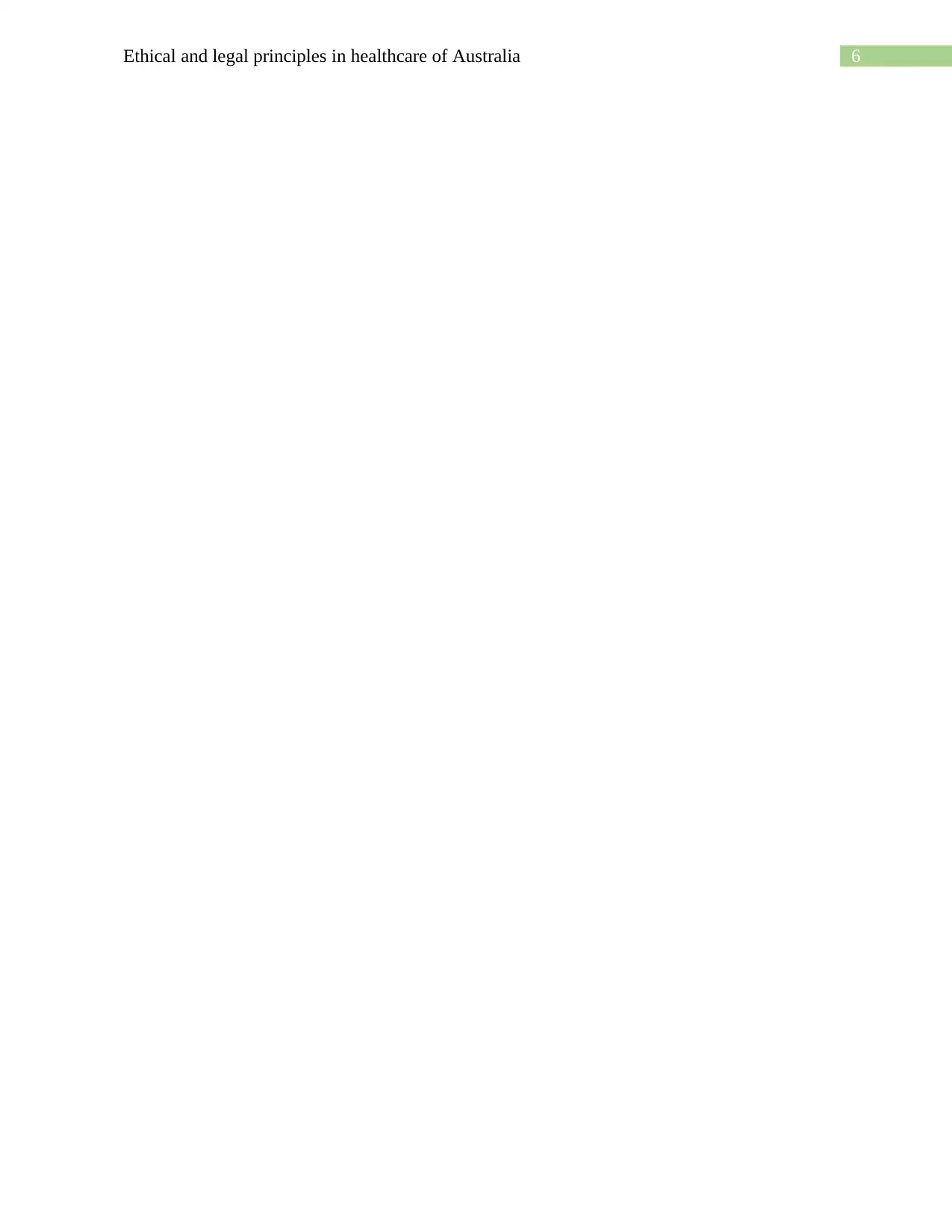
6Ethical and legal principles in healthcare of Australia
Paraphrase This Document
Need a fresh take? Get an instant paraphrase of this document with our AI Paraphraser
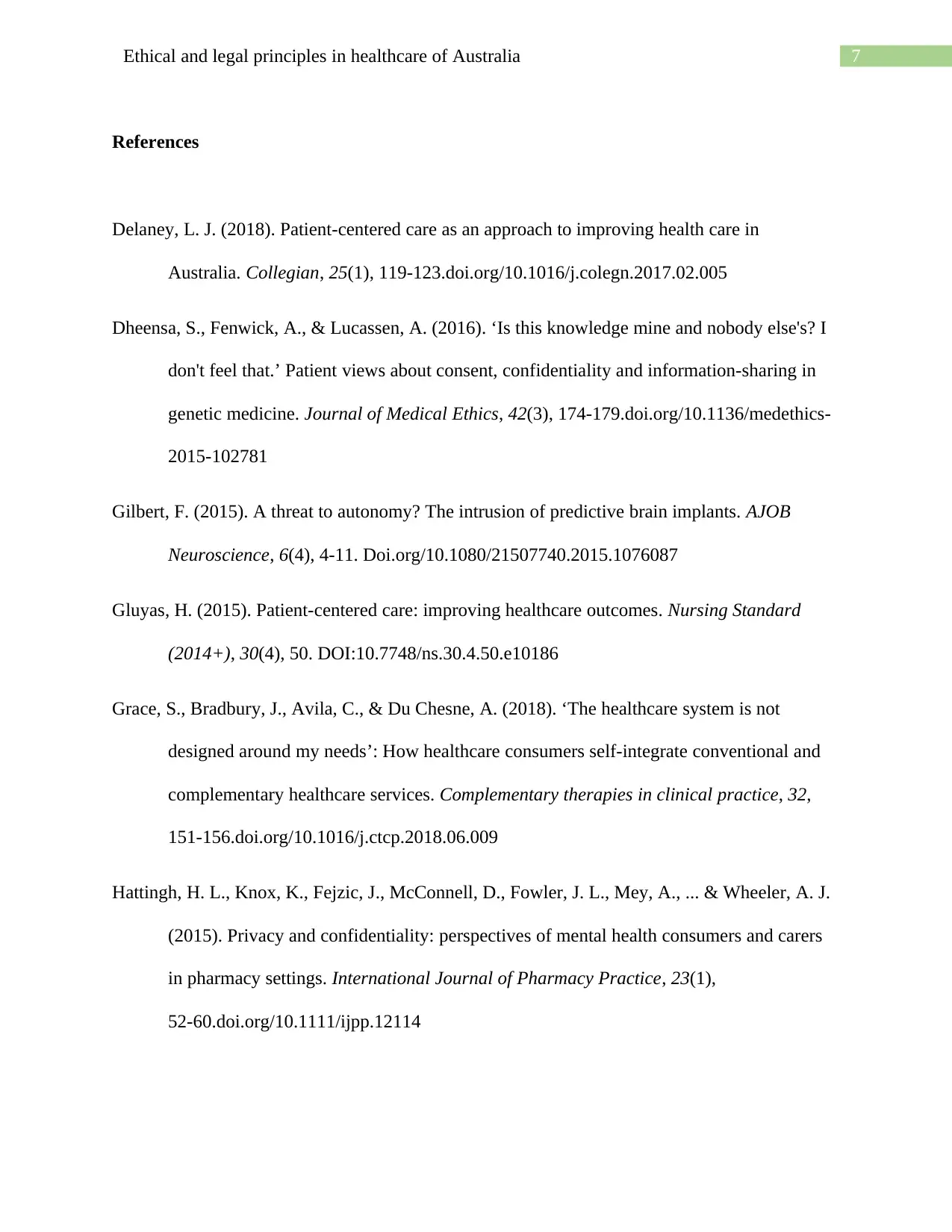
7Ethical and legal principles in healthcare of Australia
References
Delaney, L. J. (2018). Patient-centered care as an approach to improving health care in
Australia. Collegian, 25(1), 119-123.doi.org/10.1016/j.colegn.2017.02.005
Dheensa, S., Fenwick, A., & Lucassen, A. (2016). ‘Is this knowledge mine and nobody else's? I
don't feel that.’ Patient views about consent, confidentiality and information-sharing in
genetic medicine. Journal of Medical Ethics, 42(3), 174-179.doi.org/10.1136/medethics-
2015-102781
Gilbert, F. (2015). A threat to autonomy? The intrusion of predictive brain implants. AJOB
Neuroscience, 6(4), 4-11. Doi.org/10.1080/21507740.2015.1076087
Gluyas, H. (2015). Patient-centered care: improving healthcare outcomes. Nursing Standard
(2014+), 30(4), 50. DOI:10.7748/ns.30.4.50.e10186
Grace, S., Bradbury, J., Avila, C., & Du Chesne, A. (2018). ‘The healthcare system is not
designed around my needs’: How healthcare consumers self-integrate conventional and
complementary healthcare services. Complementary therapies in clinical practice, 32,
151-156.doi.org/10.1016/j.ctcp.2018.06.009
Hattingh, H. L., Knox, K., Fejzic, J., McConnell, D., Fowler, J. L., Mey, A., ... & Wheeler, A. J.
(2015). Privacy and confidentiality: perspectives of mental health consumers and carers
in pharmacy settings. International Journal of Pharmacy Practice, 23(1),
52-60.doi.org/10.1111/ijpp.12114
References
Delaney, L. J. (2018). Patient-centered care as an approach to improving health care in
Australia. Collegian, 25(1), 119-123.doi.org/10.1016/j.colegn.2017.02.005
Dheensa, S., Fenwick, A., & Lucassen, A. (2016). ‘Is this knowledge mine and nobody else's? I
don't feel that.’ Patient views about consent, confidentiality and information-sharing in
genetic medicine. Journal of Medical Ethics, 42(3), 174-179.doi.org/10.1136/medethics-
2015-102781
Gilbert, F. (2015). A threat to autonomy? The intrusion of predictive brain implants. AJOB
Neuroscience, 6(4), 4-11. Doi.org/10.1080/21507740.2015.1076087
Gluyas, H. (2015). Patient-centered care: improving healthcare outcomes. Nursing Standard
(2014+), 30(4), 50. DOI:10.7748/ns.30.4.50.e10186
Grace, S., Bradbury, J., Avila, C., & Du Chesne, A. (2018). ‘The healthcare system is not
designed around my needs’: How healthcare consumers self-integrate conventional and
complementary healthcare services. Complementary therapies in clinical practice, 32,
151-156.doi.org/10.1016/j.ctcp.2018.06.009
Hattingh, H. L., Knox, K., Fejzic, J., McConnell, D., Fowler, J. L., Mey, A., ... & Wheeler, A. J.
(2015). Privacy and confidentiality: perspectives of mental health consumers and carers
in pharmacy settings. International Journal of Pharmacy Practice, 23(1),
52-60.doi.org/10.1111/ijpp.12114
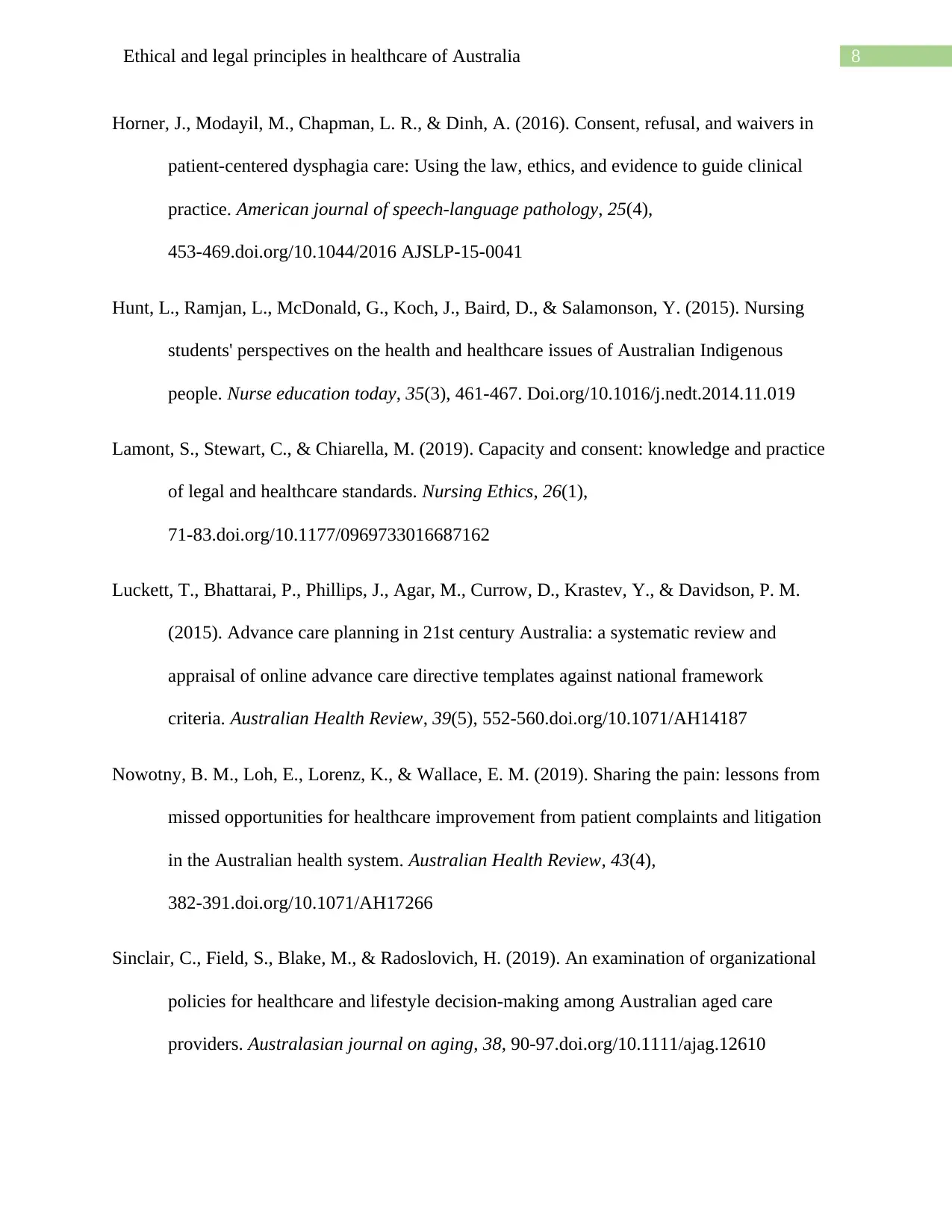
8Ethical and legal principles in healthcare of Australia
Horner, J., Modayil, M., Chapman, L. R., & Dinh, A. (2016). Consent, refusal, and waivers in
patient-centered dysphagia care: Using the law, ethics, and evidence to guide clinical
practice. American journal of speech-language pathology, 25(4),
453-469.doi.org/10.1044/2016 AJSLP-15-0041
Hunt, L., Ramjan, L., McDonald, G., Koch, J., Baird, D., & Salamonson, Y. (2015). Nursing
students' perspectives on the health and healthcare issues of Australian Indigenous
people. Nurse education today, 35(3), 461-467. Doi.org/10.1016/j.nedt.2014.11.019
Lamont, S., Stewart, C., & Chiarella, M. (2019). Capacity and consent: knowledge and practice
of legal and healthcare standards. Nursing Ethics, 26(1),
71-83.doi.org/10.1177/0969733016687162
Luckett, T., Bhattarai, P., Phillips, J., Agar, M., Currow, D., Krastev, Y., & Davidson, P. M.
(2015). Advance care planning in 21st century Australia: a systematic review and
appraisal of online advance care directive templates against national framework
criteria. Australian Health Review, 39(5), 552-560.doi.org/10.1071/AH14187
Nowotny, B. M., Loh, E., Lorenz, K., & Wallace, E. M. (2019). Sharing the pain: lessons from
missed opportunities for healthcare improvement from patient complaints and litigation
in the Australian health system. Australian Health Review, 43(4),
382-391.doi.org/10.1071/AH17266
Sinclair, C., Field, S., Blake, M., & Radoslovich, H. (2019). An examination of organizational
policies for healthcare and lifestyle decision‐making among Australian aged care
providers. Australasian journal on aging, 38, 90-97.doi.org/10.1111/ajag.12610
Horner, J., Modayil, M., Chapman, L. R., & Dinh, A. (2016). Consent, refusal, and waivers in
patient-centered dysphagia care: Using the law, ethics, and evidence to guide clinical
practice. American journal of speech-language pathology, 25(4),
453-469.doi.org/10.1044/2016 AJSLP-15-0041
Hunt, L., Ramjan, L., McDonald, G., Koch, J., Baird, D., & Salamonson, Y. (2015). Nursing
students' perspectives on the health and healthcare issues of Australian Indigenous
people. Nurse education today, 35(3), 461-467. Doi.org/10.1016/j.nedt.2014.11.019
Lamont, S., Stewart, C., & Chiarella, M. (2019). Capacity and consent: knowledge and practice
of legal and healthcare standards. Nursing Ethics, 26(1),
71-83.doi.org/10.1177/0969733016687162
Luckett, T., Bhattarai, P., Phillips, J., Agar, M., Currow, D., Krastev, Y., & Davidson, P. M.
(2015). Advance care planning in 21st century Australia: a systematic review and
appraisal of online advance care directive templates against national framework
criteria. Australian Health Review, 39(5), 552-560.doi.org/10.1071/AH14187
Nowotny, B. M., Loh, E., Lorenz, K., & Wallace, E. M. (2019). Sharing the pain: lessons from
missed opportunities for healthcare improvement from patient complaints and litigation
in the Australian health system. Australian Health Review, 43(4),
382-391.doi.org/10.1071/AH17266
Sinclair, C., Field, S., Blake, M., & Radoslovich, H. (2019). An examination of organizational
policies for healthcare and lifestyle decision‐making among Australian aged care
providers. Australasian journal on aging, 38, 90-97.doi.org/10.1111/ajag.12610
⊘ This is a preview!⊘
Do you want full access?
Subscribe today to unlock all pages.

Trusted by 1+ million students worldwide
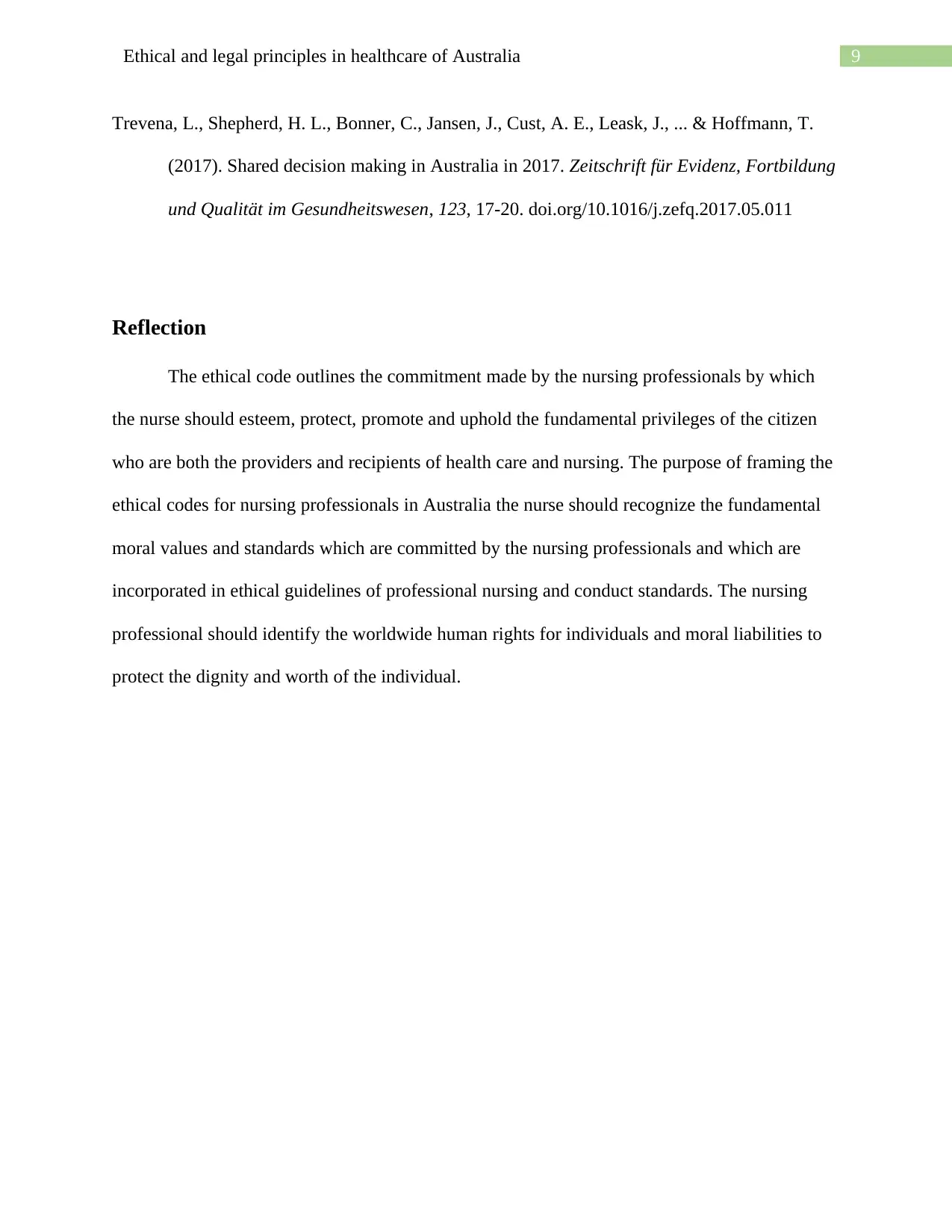
9Ethical and legal principles in healthcare of Australia
Trevena, L., Shepherd, H. L., Bonner, C., Jansen, J., Cust, A. E., Leask, J., ... & Hoffmann, T.
(2017). Shared decision making in Australia in 2017. Zeitschrift für Evidenz, Fortbildung
und Qualität im Gesundheitswesen, 123, 17-20. doi.org/10.1016/j.zefq.2017.05.011
Reflection
The ethical code outlines the commitment made by the nursing professionals by which
the nurse should esteem, protect, promote and uphold the fundamental privileges of the citizen
who are both the providers and recipients of health care and nursing. The purpose of framing the
ethical codes for nursing professionals in Australia the nurse should recognize the fundamental
moral values and standards which are committed by the nursing professionals and which are
incorporated in ethical guidelines of professional nursing and conduct standards. The nursing
professional should identify the worldwide human rights for individuals and moral liabilities to
protect the dignity and worth of the individual.
Trevena, L., Shepherd, H. L., Bonner, C., Jansen, J., Cust, A. E., Leask, J., ... & Hoffmann, T.
(2017). Shared decision making in Australia in 2017. Zeitschrift für Evidenz, Fortbildung
und Qualität im Gesundheitswesen, 123, 17-20. doi.org/10.1016/j.zefq.2017.05.011
Reflection
The ethical code outlines the commitment made by the nursing professionals by which
the nurse should esteem, protect, promote and uphold the fundamental privileges of the citizen
who are both the providers and recipients of health care and nursing. The purpose of framing the
ethical codes for nursing professionals in Australia the nurse should recognize the fundamental
moral values and standards which are committed by the nursing professionals and which are
incorporated in ethical guidelines of professional nursing and conduct standards. The nursing
professional should identify the worldwide human rights for individuals and moral liabilities to
protect the dignity and worth of the individual.
1 out of 10
Related Documents
Your All-in-One AI-Powered Toolkit for Academic Success.
+13062052269
info@desklib.com
Available 24*7 on WhatsApp / Email
![[object Object]](/_next/static/media/star-bottom.7253800d.svg)
Unlock your academic potential
Copyright © 2020–2026 A2Z Services. All Rights Reserved. Developed and managed by ZUCOL.





